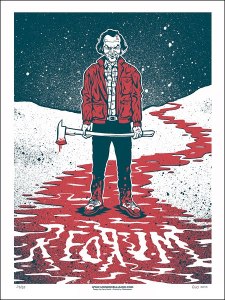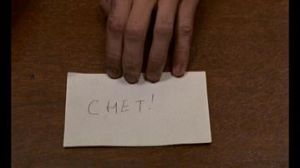 It is difficult to know what to say about The Shining, especially as so much has already been said, some of it of dubious merit.
It is difficult to know what to say about The Shining, especially as so much has already been said, some of it of dubious merit.
Like Stephen King, I am baffled as to why people find it so scary; unlike him, I rate it way more highly than his original novel (and the miniseries does not even get a look in).
It is a film I never used to like much, although I always admired its soundtrack and steadicam (Kubrick is so very effective when tracking-in that you can forgive him for his lesser parallel tracking, but, to be fair, Jean-Luc Godard’s not as good at the former as he is at the latter). And I have always been a little taken by the simple tricks Kubrick deploys – an omission here, an ambiguity there, and what Michel Chion describes as his ‘commutative editing’ – to make his films seem enigmatic and profound.
This time round, the film grew on me. I have no idea if this is because I finally watched the 25 minute longer US cut (although some months ago Roger Luckhurst predicted such an outcome, and I learned a long time ago he is usually right about stuff). I was struck very forcefully this time round by the visual and aural resonances with 2001 – and partway through the job interview scene, I stopped hearing the dialogue as being badly-delivered and started hearing it as a development of the earlier film’s depiction of linguistic thinning and debasement. Stuart Ullman (Barry Nelson) channels the performance of sincerity and the platitudinous corporate drone of Heywood Floyd (William Sylvester), and everyone sounds like they are delivering lines because that is what so much of human identity and interaction consists of – performativity.
When I recently read King’s novel, I posted about its proleptic depiction of precarious, disciplined neo-liberal labour. This is developed in Kubrick’s film. The Overlook itself, despite it age, resembles one of the non-places of hypermodernity described by Marc Augé: those spaces that are the opposite of utopia because they exist and do not contain any organic society. For all the historical markers we see on display – from those big cans of kosher dill pickles in a hotel that would once have been restricted, to the Native American designs and images on the walls, to the very 1970s purple penis carpet – it is oddly dehistoricised. It is a space that might even confound Steve Buscemi’s CHET! in its obscure blurring of ‘trans’ and ‘res’. The Torrance family, that signifier of a private realm outside the world of work and exchange, that gesture towards organic society, is destroyed by the relentless demands of the Overlook, which is only concerned with Jack as labour-power.
CHET! in its obscure blurring of ‘trans’ and ‘res’. The Torrance family, that signifier of a private realm outside the world of work and exchange, that gesture towards organic society, is destroyed by the relentless demands of the Overlook, which is only concerned with Jack as labour-power.
The Shining shows the coming proletarianisation of the American middle class, or perhaps merely charts the delusion of social mobility at the core of the American Dream. This is Jack – the terrorised and terrorising, self-surveilling, self-disciplining and other-discipling sadomasochistic subject of a monstrous power. Just the way capital likes it.
 And management doesn’t care for one moment that he has produced the treatise on work-life balance. To the Overlook, it’s just a paper trail to prove the staff have been consulted at.
And management doesn’t care for one moment that he has produced the treatise on work-life balance. To the Overlook, it’s just a paper trail to prove the staff have been consulted at.
I agree about the scariness (or better lack thereof). While this is certainly not very original, «The Shining» seemed to me always like meta-horror. This is not so much a horror film, but a film which plays with all kind of horror tropes without really resolving anything. We get an invisible friend, a haunted house, ghosts, revenants, a possessed father, telepathy, axes, knives (I love the shot of all the «Psycho» knives in the kitchen), but somehow this all doesn’t really add up into something coherent. What is actually going on in the Overlook? Has the evil force been defeated? No idea.
LikeLike
Reblogged this on lone wolf and blog.
LikeLike